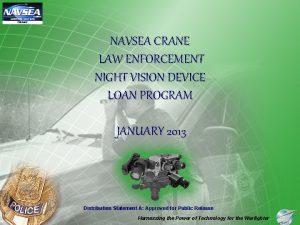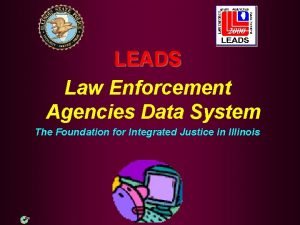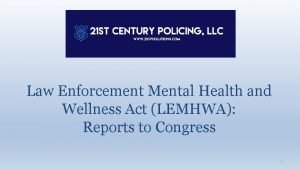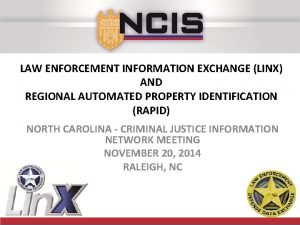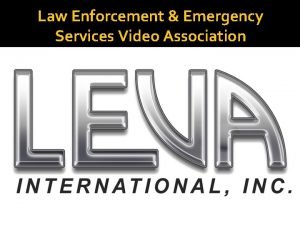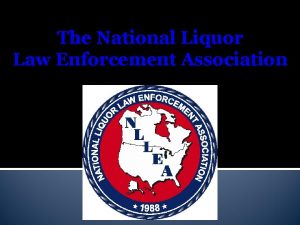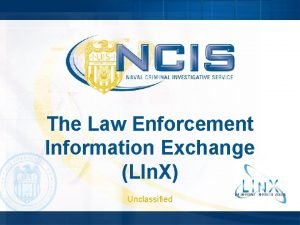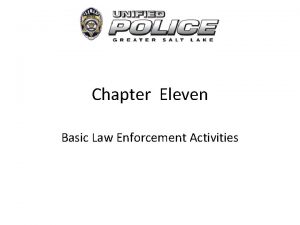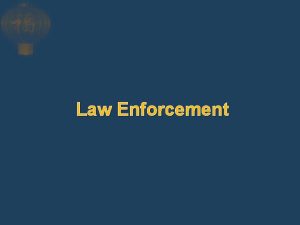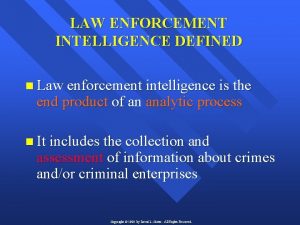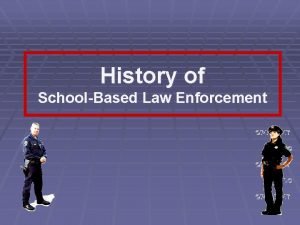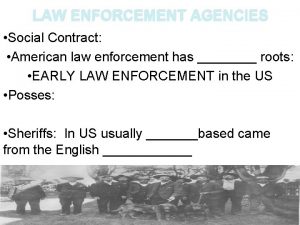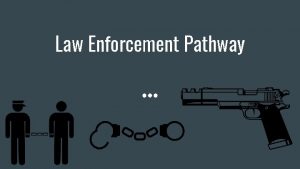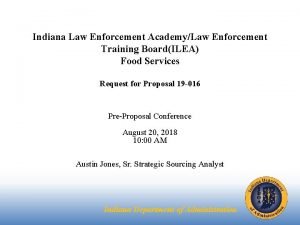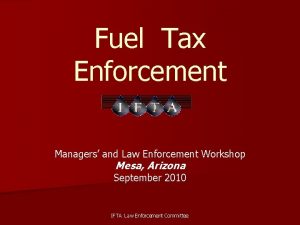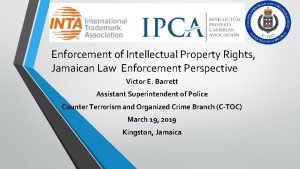Chapter 1 Origins of Federal Law Enforcement in











- Slides: 11

Chapter 1: Origins of Federal Law Enforcement in America Federal Law Enforcement: A Primer Bumgarner, Crawford, & Burns Powerpoints by Ryan Branch & Keith Logan Copyright © 2014 Carolina Academic Press. All rights reserved.

Origins of Federal Law Enforcement • U. S. Constitution does not confer general police power to the national government – Gives broader policing power to the states – However, Constitution does envision a law enforcement responsibility for the national government (i. e. enforcing enumerated powers and treason) – 4 th, 5 th, 6 th, and 8 th Amendments all protect citizens from federal government power • The Necessary and Proper Clause of the Constitution (Article I, Section 8) – Gives government the ability to exercise its responsibilities through all necessary and proper means Copyright © 2014 Carolina Academic Press. All rights reserved.

Origins of Federal Law Enforcement (Cont’d) • Early American federal law enforcement’s 4 functions: – 1) Enforcing taxes as tariffs – 2) Serving the federal judicial system – 3) Securing public facilities – 4) Protecting the postal system Copyright © 2014 Carolina Academic Press. All rights reserved.

Enforcing Taxes and Tariffs • Tariff Act of 1789, signed into law July 4, 1789 – Authorized U. S. government to collect duties on imports • Fifth Act of Congress passed August 1789 – Created United States Customs • Placed under the Department of Treasury • Covered 100+ ports of entry – Revenue Cutter Service – cutter fleet operated by U. S. customs • Used to combat smuggling, piracy, and anti-slave trafficking laws – U. S. Customs primary source of federal funds for 125 years • Completely paid off federal debt by 1835 Copyright © 2014 Carolina Academic Press. All rights reserved.

Serving the Federal Judiciary System • Judiciary Act of 1789 • Created 13 federal judicial districts, federal district and appellate courts, the office of U. S. Attorney in each district, and the office of U. S. Marshal in each district – U. S. Marshals considered to be first federal law enforcement officers with an exclusively law enforcement mission • Served federal court orders, captured/delivered federal prisoners, & enforced summonses of citizens for jury duty to serve as jurors • Acts and policies under investigation jurisdiction of U. S. Marshals: – Alien Act of 1798, Sedition Act of 1798, immigration laws, slave trade violations, & post-Civil War civil rights violations Copyright © 2014 Carolina Academic Press. All rights reserved.

Securing Public Facilities • In 1790, Congress appointed a commission to manage and protect facilities while they were under construction in Washington, D. C. • Started as six (6) night watchmen – Originally overseen by a superintendent of public buildings, then Office of the Commissioner in 1816 – Department of Interior (DOI) established in 1849 • DOI was given the management and control over public facilities • H. R. 158, An Act Making Appropriations for Public Buildings and Other Purposes – April 29, 1828 – Created the Capitol police force (largely undertrained, relied on D. C. auxiliary guard) – Absorbed into DOI at its formation Copyright © 2014 Carolina Academic Press. All rights reserved.

Protecting the Postal System • 1772, Benjamin Franklin created the “surveyor” position – Provided regulatory and audit support, providing security and integrity to the postal system • Became the position of “special agent” in 1801 • Office of Instructions and Mail Depredations creating within USPS in 1830 – Its agents: • Tracked down USPS embezzlers, thieves, & robbers targeting mail staff and transportation equipment • Possessed a full range of law enforcement authority – Power to carry fire arms – Power to execute warrants as agents of the federal government Copyright © 2014 Carolina Academic Press. All rights reserved.

Federal Law Enforcement Expands with the Nation • Issues in American Western Frontier during expansion: – Native American tribes raiding/attacking westward settlers – Many criminals & outlaws went west due to little law enforcement presence • Potentially only a handful of U. S. Marshals in the equivalent area of 1 -2 modern-day states – Often the only civilian law enforcement power in the western territories • If federal money or property were taken in a robbery, the U. S. Marshals were granted jurisdiction of the case – Could also have joint jurisdictions with local authorities within states & organized territories Copyright © 2014 Carolina Academic Press. All rights reserved.

Federal Law Enforcement Expands with the Nation (Cont’d) • U. S. Department of Justice (DOJ) – July 1870 – Given authority over federal law enforcement activities – Absorbed the Office of U. S. Marshals • Marshals became salary-based, department employees • U. S. Secret Service (USSS) – April 1865 • USSS was placed under the Department of Treasury – Combatted counterfeit currency – easy to do before end of civil war • Each state bank could create/produce its own notes • Confederacy used counterfeits in attempt to ruin Northern economy Copyright © 2014 Carolina Academic Press. All rights reserved.

Federal Law Enforcement Expands with the Nation (Cont’d) • U. S. Secret Service (Cont’d) – Extremely successful • By 1865 counterfeiting considered only a minor problem – Sundry Civil Expenses Act of 1907 • USSS expressly delegated as permanent protective agency for U. S. presidents • Began in 1894 by USSS employees informally protecting President G. Cleveland – Cleveland receiving threats to a USSS fraud case • 1865 -1901, 3 presidential assassinations (Lincoln, Garfield, Mc. Kinley) • Politicians worried that if U. S. Military used for personal detail, it would give president too much power (e. g. , using personal detail for secret orders) – House Judiciary Committee recommended use of USSS – passed in 1907 Copyright © 2014 Carolina Academic Press. All rights reserved.

The full set of Power. Point slides is available upon adoption. Email bhall@cap-press. com for more information.
 Texas commission on law enforcement
Texas commission on law enforcement Crane night vision lease program
Crane night vision lease program Leads 2000
Leads 2000 Lemhwa report to congress
Lemhwa report to congress Linx law enforcement information exchange
Linx law enforcement information exchange Law enforcement video association
Law enforcement video association Virginia law enforcement assistance program
Virginia law enforcement assistance program National liquor law enforcement association
National liquor law enforcement association Law enforcement information exchange
Law enforcement information exchange Elvis vehicle inspection
Elvis vehicle inspection Military and law enforcement
Military and law enforcement Military and law enforcement
Military and law enforcement

